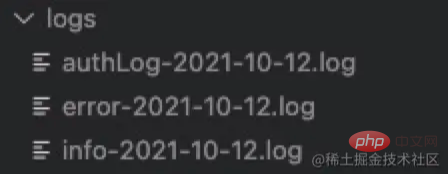
This article will introduce to you how to use the Winston library to build a simple logging function in Node.js. I hope it will be helpful to everyone!

Winston is one of the powerful and flexible Node.js open source log libraries. In theory, Winston is a logger that can record all information. This is a highly intuitive tool that is easy to customize. The logic behind it can be adjusted by changing a few lines of code. It makes logging to persistent storage locations such as databases or files simple and easy. [Recommended learning: "nodejs Tutorial"]
Winston Provides the following functions:
The practice code will add the logging function to the projectpretender-service, and install the dependencies:
npm install winston --save
The next step is to initialize logger, since there is already a logger.js file in the project, create another winstonLogger.js here, the code is as follows:
const { createLogger, format, transports } = require("winston");
module.exports = createLogger({
transports: [
new transports.File({
filename: "logs/server.log",
level: "info",
format: format.combine(
format.timestamp({ format: "MMM-DD-YYYY HH:mm:ss" }),
format.align(),
format.printf(
(info) =>
`${info.level}: ${[info.timestamp]}: ${info.message}`
)
),
}),
],
}); Passed Call the createLogger function in the winston library to initialize the logger. In the transports object, you can provide a filename to store the logs in a file. By default, logging is unformatted and printed as a JSON string with two parameters, the log message and the level.
Next, modify the previous logger and add the winston logger. Please refer to the code for the specific modification method. Here is how to use it:
const winlogger = require("./winstonLogger");
winlogger.info("日志内容");After executing the program, the corresponding log file can be generated in the root directory logs/server.log

You can also change the log level, Modify logger and only use winston in console.error mode:

records the database connection Error messages, the above information is for demonstration only.
winston Allows setting multiple transport, change createLogger# in winstonLogger.js ## The function is as follows:
const { createLogger, format, transports } = require("winston");
module.exports = createLogger({
format: format.combine(
format.timestamp({ format: "MMM-DD-YYYY HH:mm:ss" }),
format.align(),
format.printf((i) => `${i.level}: ${[i.timestamp]}: ${i.message}`)
),
transports: [
new transports.File({
filename: "logs/info.log",
level: "info",
format: format.combine(
format.printf((i) =>
i.level === "info"
? `${i.level}: ${i.timestamp} ${i.message}`
: ""
)
),
}),
new transports.File({
filename: "logs/error.log",
level: "error",
}),
],
});error.log and info.log files, because in logger info is not set in , so the content of info.log is empty, and the content of error.log is the same as above.
winston Allows the setting of multiple loggers. In actual projects, a logger can be created for each modulelogger , the following code creates a user logger and login verification recorder:
const { createLogger, format, transports } = require("winston");
const customFormat = format.combine(
format.timestamp({ format: "MMM-DD-YYYY HH:mm:ss" }),
format.align(),
format.printf((i) => `${i.level}: ${[i.timestamp]}: ${i.message}`)
);
const globalLogger = createLogger({
format: customFormat,
transports: [
new transports.File({
filename: "logs/info.log",
level: "info",
format: format.combine(
format.printf((i) =>
i.level === "info"
? `${i.level}: ${i.timestamp} ${i.message}`
: ""
)
),
}),
new transports.File({
filename: "logs/error.log",
level: "error",
}),
],
});
const authLogger = createLogger({
transports: [
new transports.File({
filename: "logs/authLog.log",
format: customFormat,
}),
],
});
module.exports = {
globalLogger: globalLogger,
authLogger: authLogger,
};globalLogger and an authentication loggerauthLogger, corresponding modification logger.js:
const { globalLogger } = require("./winstonLogger");
globalLogger.error(message);Winston related dependency library.
npm install winston-daily-rotate-file --save
winstonLogger.js file:
const { createLogger, format, transports } = require("winston");
require("winston-daily-rotate-file");
const customFormat = format.combine(
format.timestamp({ format: "MMM-DD-YYYY HH:mm:ss" }),
format.align(),
format.printf((i) => `${i.level}: ${[i.timestamp]}: ${i.message}`)
);
const defaultOptions = {
format: customFormat,
datePattern: "YYYY-MM-DD",
zippedArchive: true,
maxSize: "20m",
maxFiles: "14d",
};
const globalLogger = createLogger({
format: customFormat,
transports: [
new transports.DailyRotateFile({
filename: "logs/info-%DATE%.log",
level: "info",
...defaultOptions,
}),
new transports.DailyRotateFile({
filename: "logs/error-%DATE%.log",
level: "error",
...defaultOptions,
}),
],
});
const authLogger = createLogger({
transports: [
new transports.DailyRotateFile({
filename: "logs/authLog-%DATE%.log",
...defaultOptions,
}),
],
});
module.exports = {
globalLogger: globalLogger,
authLogger: authLogger,
};
Winston has been introduced. The above can basically meet the needs of daily projects.
For more programming-related knowledge, please visit: Programming Video! !
The above is the detailed content of A brief analysis of how the Node.js+Winston library builds a simple logging function. For more information, please follow other related articles on the PHP Chinese website!
 node.js debugging
node.js debugging
 How to solve the problem of missing steam_api.dll
How to solve the problem of missing steam_api.dll
 How to implement h5 to slide up and load the next page on the web side
How to implement h5 to slide up and load the next page on the web side
 What is the principle and mechanism of dubbo
What is the principle and mechanism of dubbo
 How to resume use of gas after payment
How to resume use of gas after payment
 How to modify the text in the picture
How to modify the text in the picture
 What are the methods for restarting applications in Android?
What are the methods for restarting applications in Android?
 Where to buy Bitcoin
Where to buy Bitcoin
 How to open WeChat html file
How to open WeChat html file